Find Help
More Items From Ergsy search
-
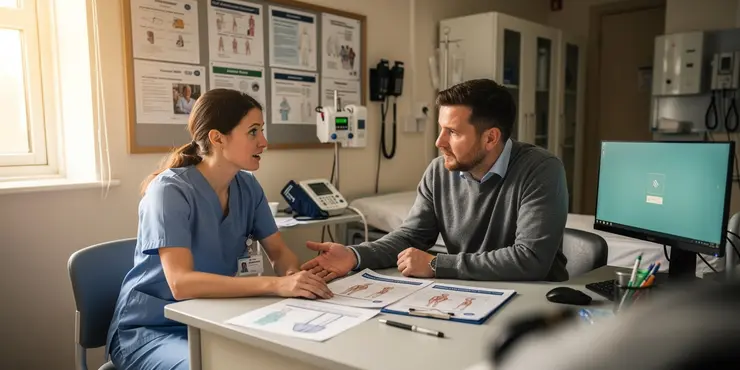
Mechanical Lower Back Pain
Relevance: 100%
-
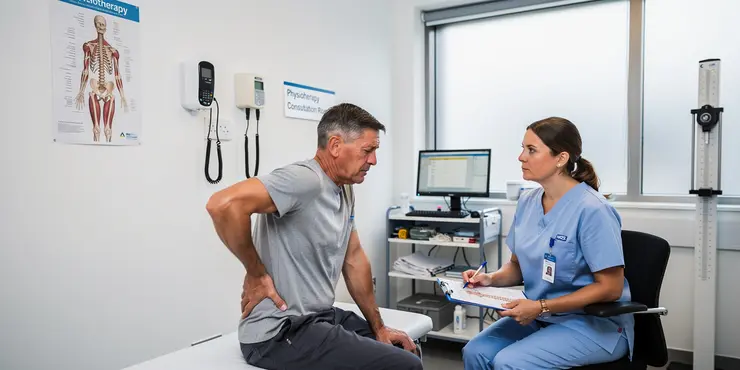
MSK Lower Back Pain information video
Relevance: 92%
-
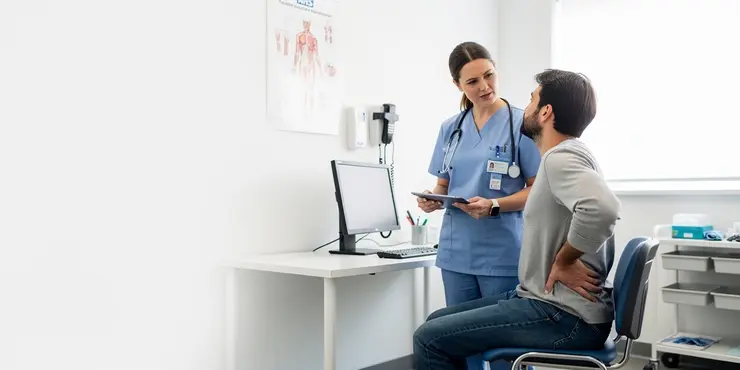
Useful information for patients with lower back pain
Relevance: 92%
-
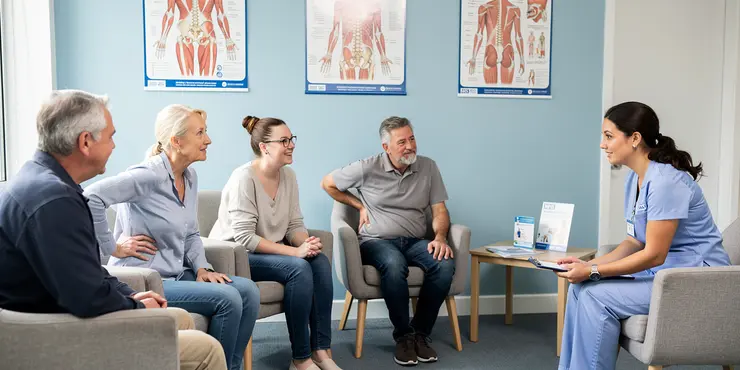
Useful information for patients with lower back pain
Relevance: 91%
-
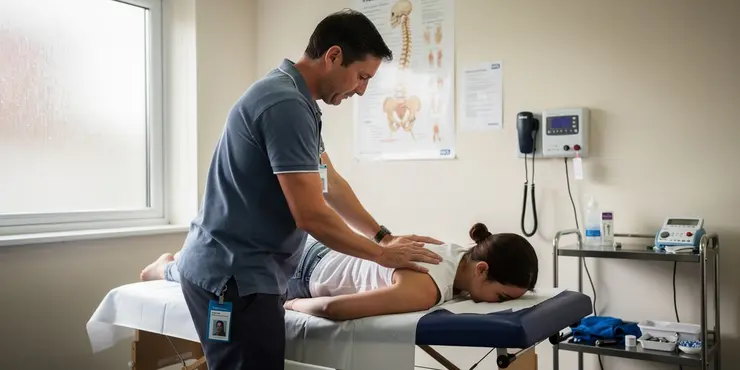
How do chiropractors treat back pain?
Relevance: 64%
-
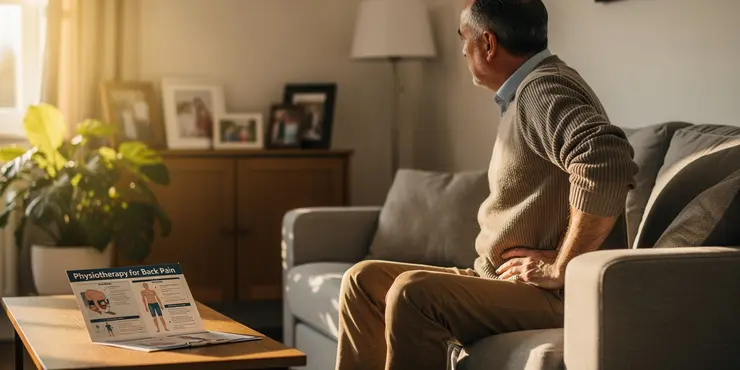
How to treat back pain | NHS
Relevance: 62%
-
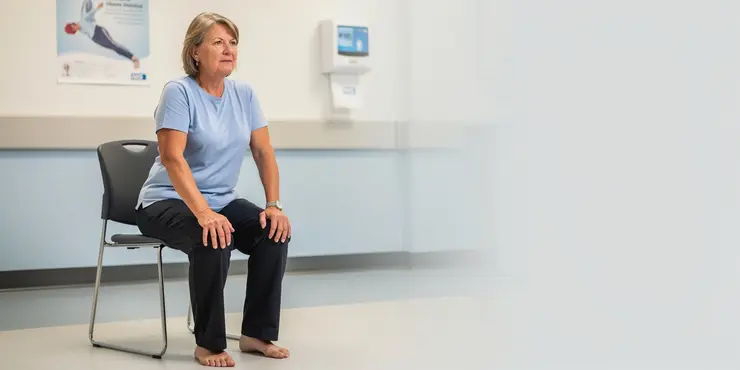
Pilates for back pain: Seated waist twist | NHS
Relevance: 59%
-
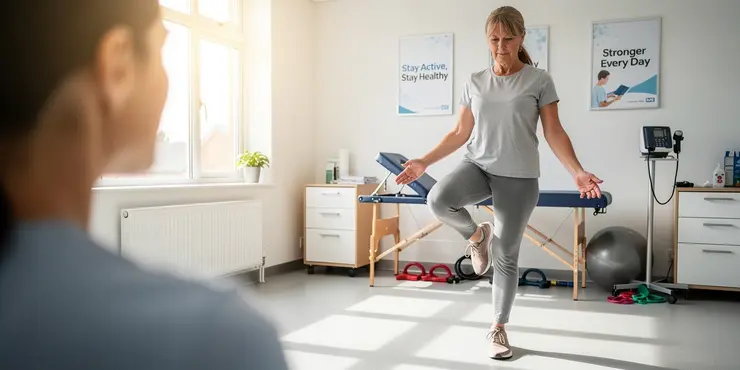
Pilates for back pain: Standing on one leg | NHS
Relevance: 58%
-
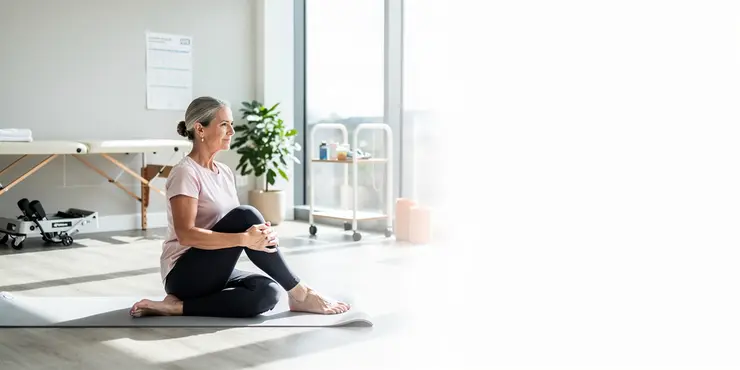
Pilates for back pain: Seated waist twist | NHS
Relevance: 56%
-
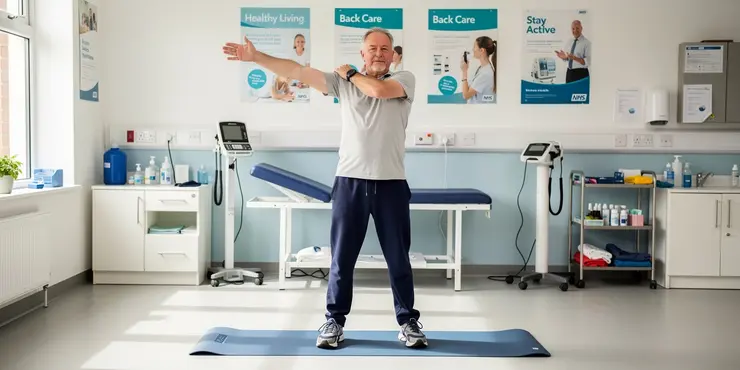
Back stretches | NHS
Relevance: 53%
-
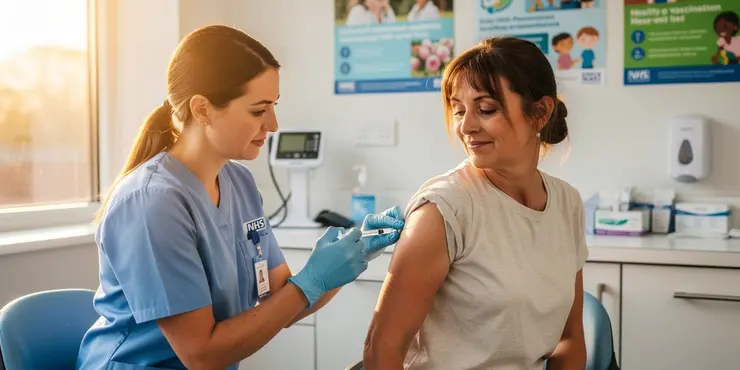
Evidence-Based Interventions: injections for non-specific low back pain without sciatica
Relevance: 51%
-
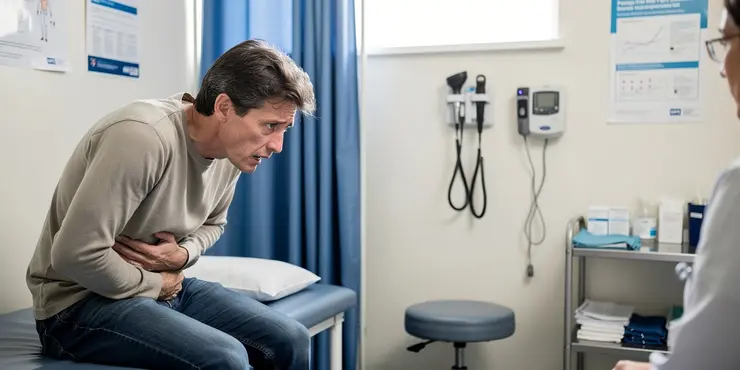
Where is the pain located when you have appendicitis?
Relevance: 41%
-
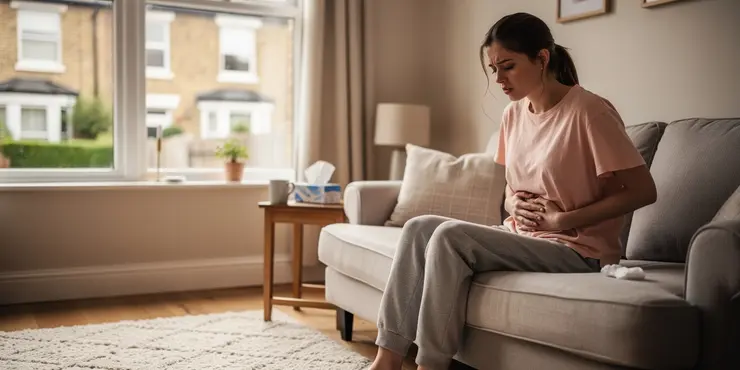
Period pain (dysmenorrhoea) - BSL
Relevance: 40%
-
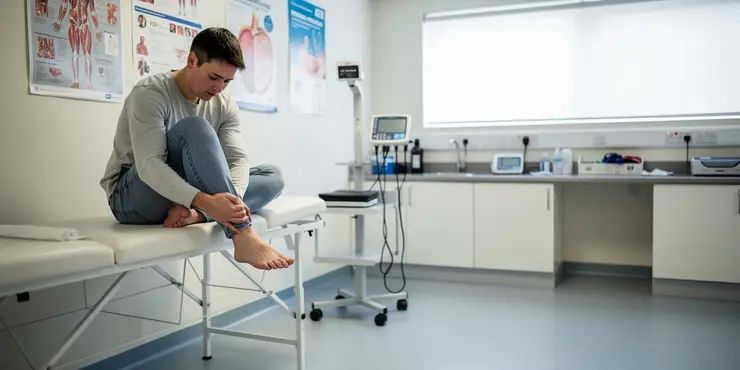
Foot Pain
Relevance: 36%
-
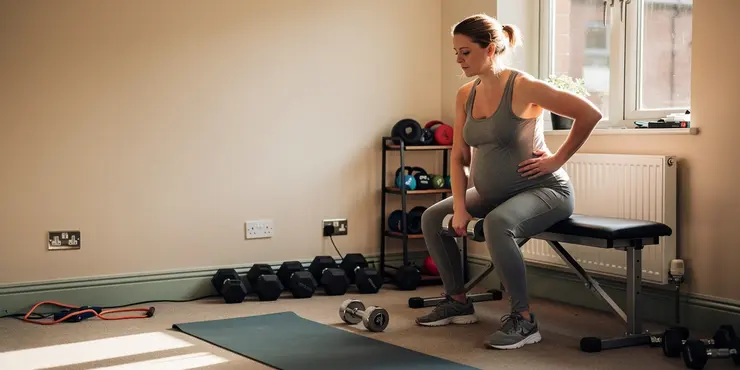
Should I avoid lying on my back during exercise?
Relevance: 36%
-
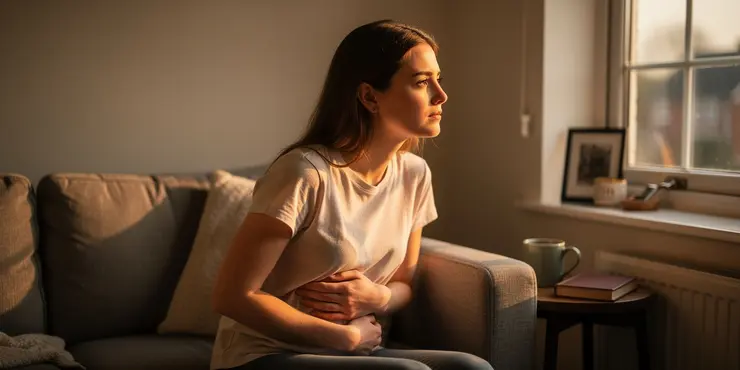
How to deal with period pain | NHS
Relevance: 35%
-
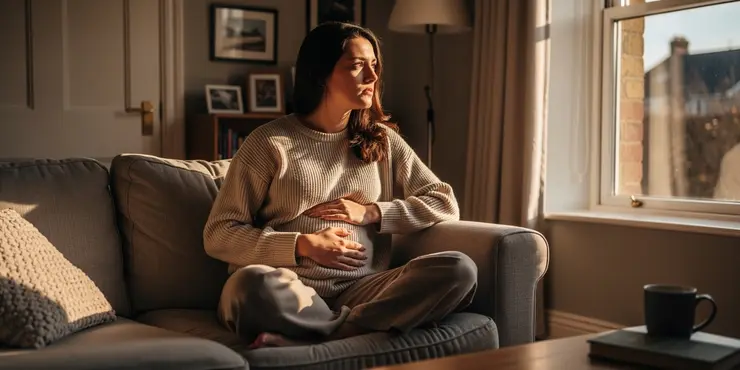
How to deal with period pain | NHS
Relevance: 34%
-
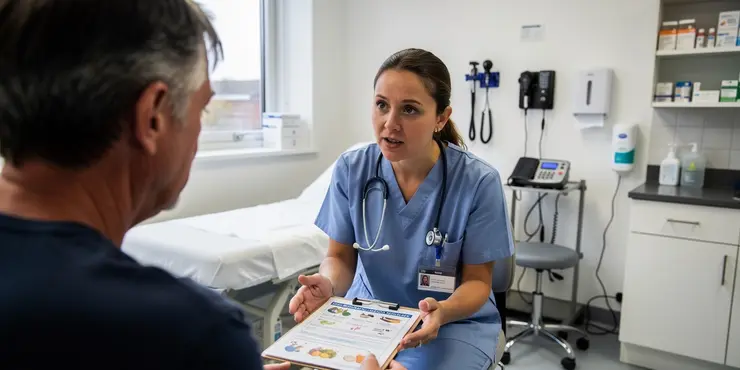
What lifestyle changes can lower blood pressure?
Relevance: 34%
-
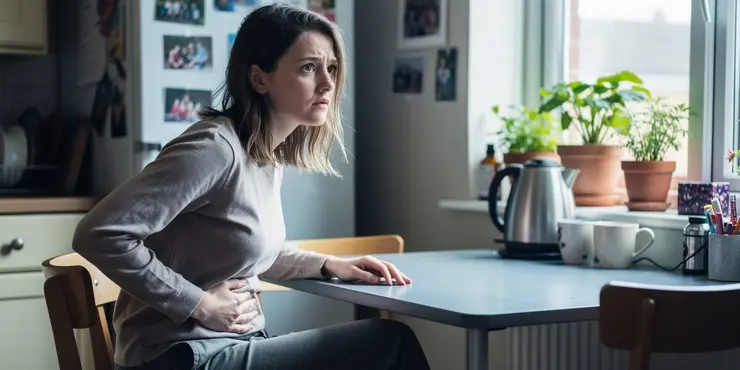
How to deal with period pain | NHS
Relevance: 34%
-
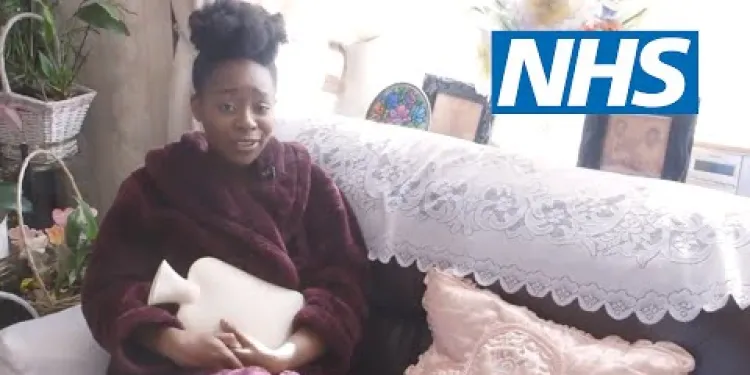
How to deal with period pain | NHS
Relevance: 33%
-
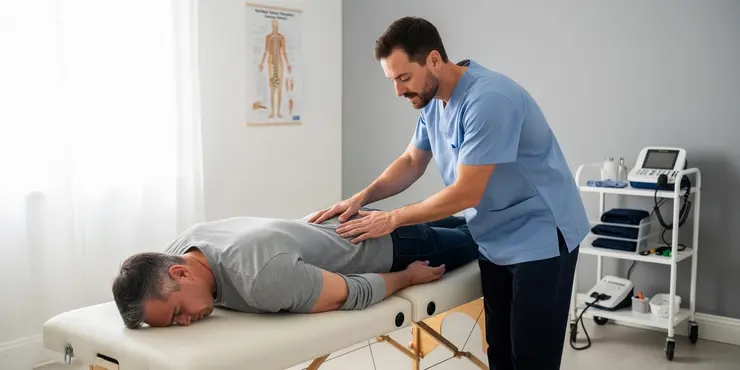
Are chiropractic treatments painful?
Relevance: 33%
-
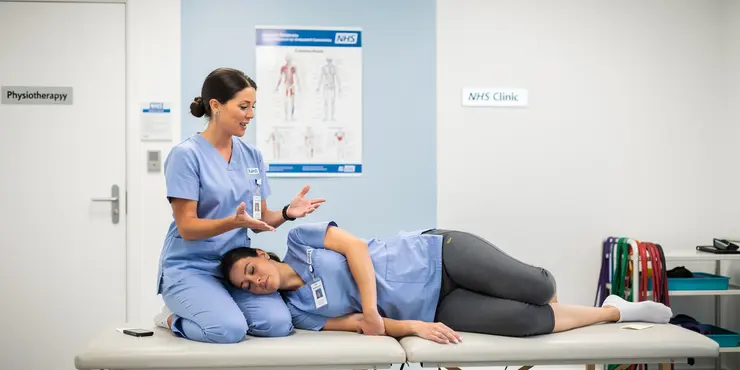
Exercises to help your lateral hip pain
Relevance: 33%
-

Is impetigo painful?
Relevance: 32%
-
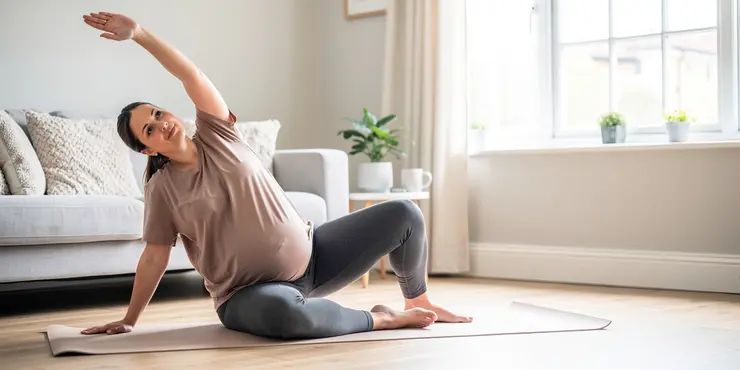
Can lifestyle changes help manage pain and fever during pregnancy?
Relevance: 32%
-
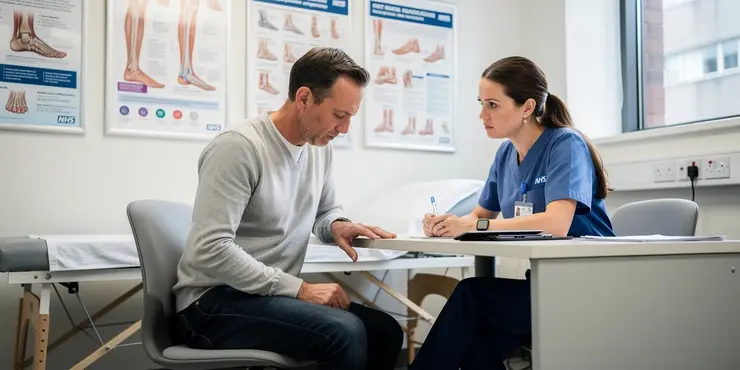
Heel pain | NHS
Relevance: 32%
-

Can Inheritance Tax be claimed back?
Relevance: 32%
-
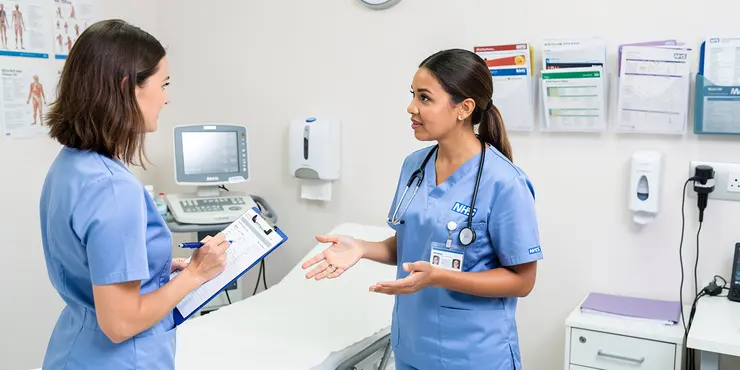
Are there any fees to claim money back?
Relevance: 32%
-
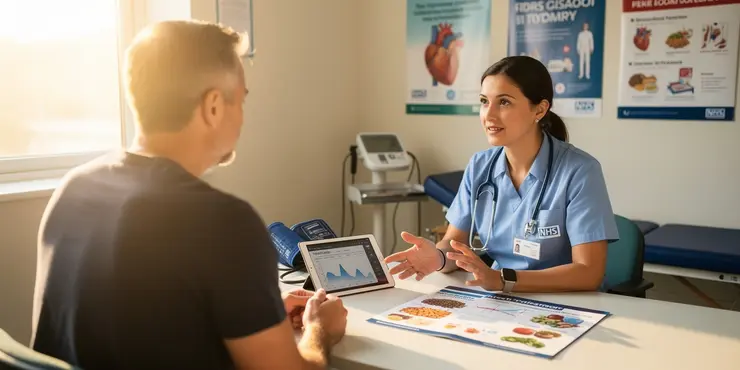
Can fiber help lower cholesterol levels?
Relevance: 31%
-
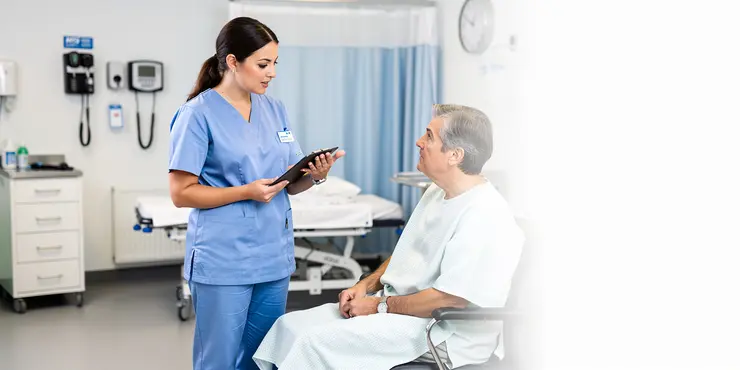
Is a facelift painful?
Relevance: 31%
-
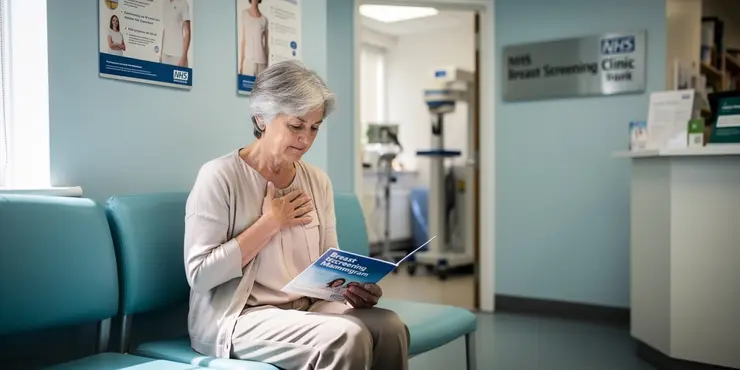
Is a mammogram painful?
Relevance: 31%
-

Mat and gym ball exercises with pregnancy related Pelvic Girdle Pain
Relevance: 31%
-
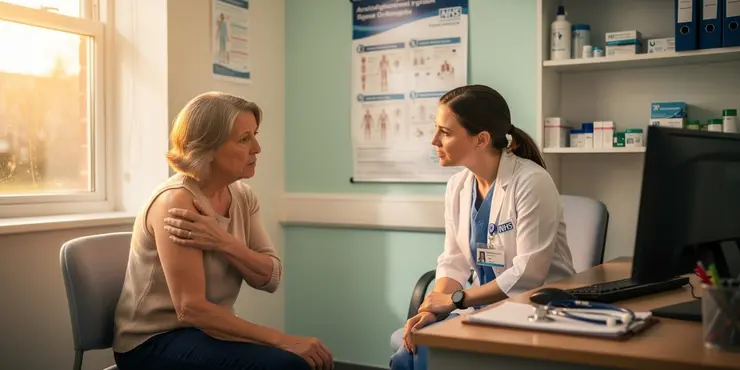
Shoulder pain | NHS
Relevance: 30%
-
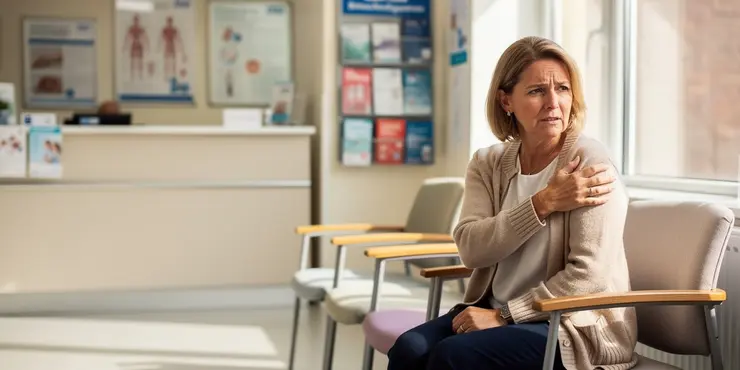
Shoulder pain | NHS
Relevance: 30%
-
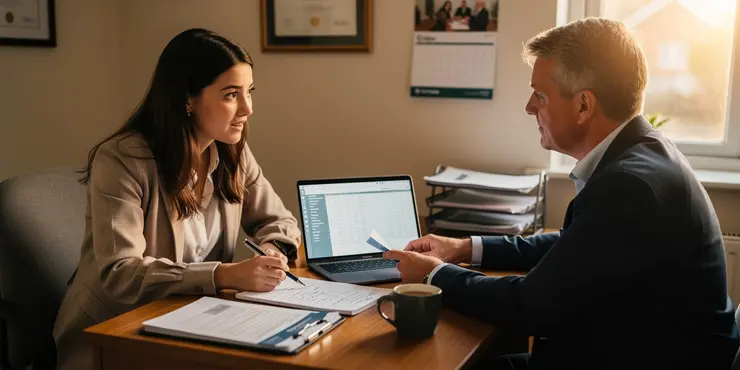
What happens to my loans if I go back to school?
Relevance: 30%
-
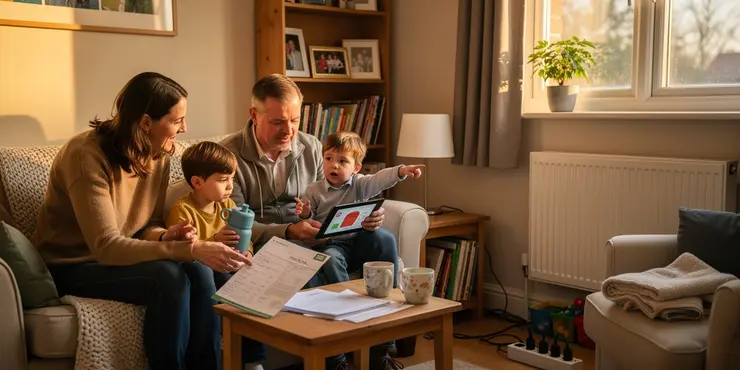
How can I lower my monthly utility bills?
Relevance: 30%
-
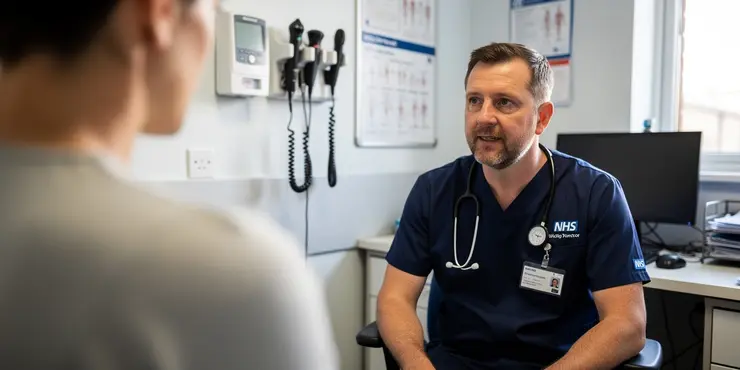
How is appendicitis different from other causes of abdominal pain?
Relevance: 30%
-
Is it better to choose a higher deductible for lower premiums?
Relevance: 29%
-
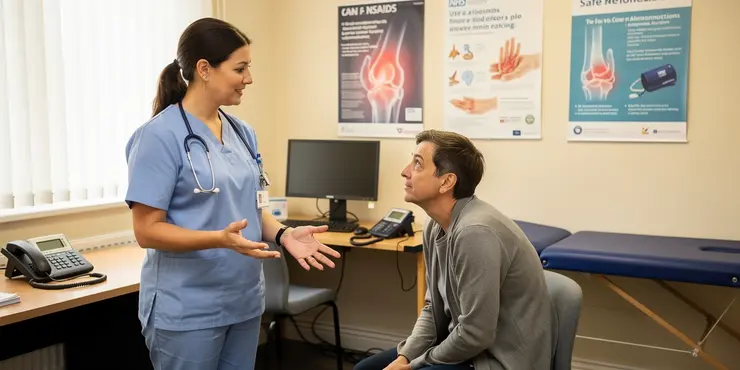
How do NSAIDs work to reduce pain?
Relevance: 29%
-
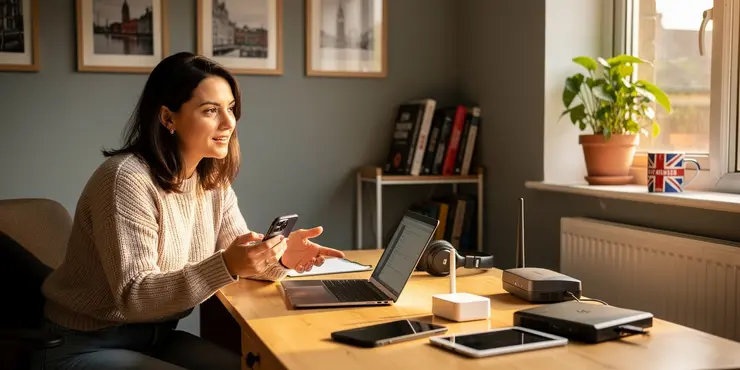
What is the best way to back up my mobile phone data?
Relevance: 29%
-
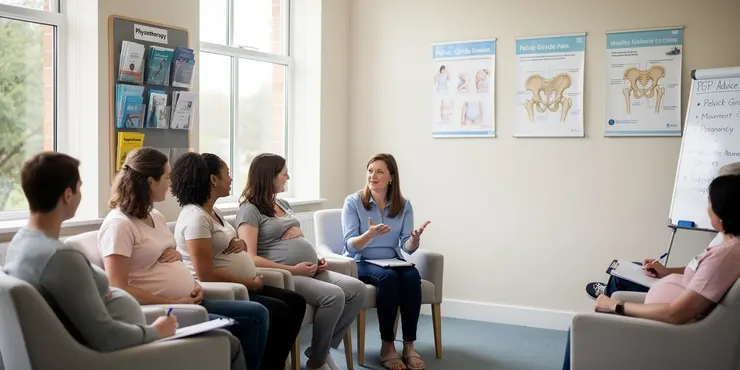
Pelvic Girdle Pain Advice Class
Relevance: 29%
Useful Information for Patients with Lower Back Pain
Understanding Lower Back Pain
Lower back pain is a common affliction that affects many individuals in the United Kingdom. It can be caused by a variety of factors, including muscle strain, poor posture, or underlying medical conditions. Understanding the root cause of your pain can help in managing and alleviating symptoms more effectively.
When to Seek Medical Help
If your lower back pain persists for more than a few weeks, worsens over time, or is accompanied by other symptoms such as fever, weight loss, or numbness in the legs, it is important to seek medical advice. GPs in the UK can provide an initial diagnosis and may refer you to a specialist if necessary.
Self-Care and Management
There are several self-care strategies that can help manage lower back pain. Maintaining a good posture, staying active with gentle exercises like walking or swimming, and applying hot or cold packs to the affected area can provide relief. Over-the-counter pain medications, like ibuprofen or paracetamol, may also be helpful in managing pain and inflammation.
Physiotherapy and Professional Treatment
Physiotherapy is a common treatment for lower back pain and can be accessed through the NHS or privately in the UK. A physiotherapist can create a personalised exercise programme to strengthen the back muscles and improve flexibility. Other treatments might include chiropractic care, acupuncture, or massage therapy, which should be undertaken under professional guidance.
Prevention Tips
Preventing lower back pain involves adopting healthy lifestyle habits. Regular exercise, maintaining a healthy weight, avoiding prolonged sitting, and using ergonomic furniture can reduce the risk of developing back pain. If your job involves heavy lifting, learning proper lifting techniques is essential to avoid injury.
Mental Health and Support
Living with chronic lower back pain can affect mental health. Accessing support through counselling or joining a support group can be beneficial. Many UK-based organisations and charities provide resources and support for individuals dealing with chronic pain.
Useful Resources
For further information and support, consider visiting reputable UK-based health websites such as NHS Choices, British Pain Society, or the Chartered Society of Physiotherapy. These websites offer expert advice, practical tips, and resources to help manage and alleviate lower back pain.
Managing Lower Back Pain: Essential Information for UK Patients
Lower back pain is a common concern affecting many individuals in the UK. Understanding its causes, available treatments, and preventive measures can significantly enhance your quality of life. Here is some useful information to help manage and alleviate lower back pain effectively.
Common Causes of Lower Back Pain
Lower back pain can be attributed to various factors. Strains or sprains from physical activities, prolonged sitting, poor posture, and underlying medical conditions like herniated discs or arthritis are frequent causes. Identifying the source of pain is crucial for determining the most effective treatment approach.
Treatment Options Available
Addressing lower back pain often involves a combination of treatments. Over-the-counter pain relief medications and anti-inflammatory drugs can help manage discomfort. Physiotherapy focuses on strengthening muscles and improving flexibility to support the back. In some cases, healthcare providers may recommend more advanced interventions such as chiropractic care, acupuncture, or even surgery, depending on the severity and underlying cause of the pain.
Preventive Measures to Consider
Preventing lower back pain involves adopting healthy habits. This includes maintaining a proper posture, especially in sedentary work environments. Regular exercise, such as walking or swimming, promotes strength and flexibility. Ensuring ergonomic workspaces and investing in supportive mattresses and chairs can also help reduce the risk of developing lower back pain.
When to Seek Medical Advice
If lower back pain persists despite home remedies or is accompanied by symptoms such as numbness, weakness, or loss of bladder or bowel control, it is crucial to seek medical attention promptly. Early intervention by healthcare professionals ensures a comprehensive evaluation and tailored treatment plan, improving outcomes significantly.
By understanding these aspects, patients in the UK can take proactive steps to manage and alleviate lower back pain, leading to improved daily functioning and overall well-being.
Helpful Information for People with Lower Back Pain
What is Lower Back Pain?
Lower back pain is when your lower back hurts. Many people in the UK have this pain. It can happen because of muscle strain, bad posture, or health problems. Knowing why your back hurts can help you feel better.
When to Get Help from a Doctor
If your back pain lasts more than a few weeks, gets worse, or you have other symptoms like fever, losing weight, or numb legs, you should see a doctor. Doctors in the UK can help find out what's wrong and may send you to a specialist.
Things You Can Do to Help Yourself
You can do some things at home to feel better. Stand straight, do easy exercises like walking or swimming, and use hot or cold packs on your back. You can also take pain killers like ibuprofen or paracetamol.
Getting Help from Professionals
Physiotherapy can help with back pain. You can get this help through the NHS in the UK. A physiotherapist can make a special exercise plan for you. Other treatments like chiropractic care, acupuncture, or massage can also help, but you should talk to a professional.
How to Stop Back Pain
You can help stop back pain by being healthy. Exercise often, keep a healthy weight, don't sit for too long, and use good furniture. If you have to lift heavy things at work, learn how to do it safely.
Mental Health and Help
Having back pain for a long time can make you feel sad. Talking to someone or joining a group can help. There are many organisations in the UK that can give you support and information.
More Information
You can find more help on UK health websites like NHS Choices, the British Pain Society, or the Chartered Society of Physiotherapy. These websites have good advice and tips on how to feel better.
Managing Lower Back Pain: Important Information for People in the UK
Lower back pain is common for many people in the UK. Knowing why it happens and how to treat it can help make life better. Here is some easy information to help you manage lower back pain.
Why Does Lower Back Pain Happen?
Many things can cause lower back pain. You might hurt your back if you do a lot of physical activity or sit too long. Poor posture can also cause pain. Sometimes, health problems like a slipped disc or arthritis can cause back pain. Knowing why your back hurts is important to find the best way to treat it.
How to Treat Lower Back Pain
You can use different ways to treat back pain. You can take medicine you buy from a shop to help with pain. Exercise with the help of a physiotherapist can make your back stronger. Sometimes, doctors might say you need special treatments like seeing a chiropractor, trying acupuncture, or even having an operation. It depends on how bad your pain is.
How to Stop Lower Back Pain
To stop back pain, you can do some healthy things. Sit and stand properly, especially if you sit a lot at work. Exercise often, like walking or swimming, to help keep your back strong. Have a good chair and bed to support your back.
When to See a Doctor
If your back still hurts after trying things at home, or if you feel tingling, weakness, or trouble going to the toilet, you should see a doctor quickly. Doctors can check you and help with correct treatments to make you feel better.
By knowing this, people in the UK can take good steps to manage back pain. This can help you feel better and live well every day.
Frequently Asked Questions
What are the common causes of lower back pain?
Common causes of lower back pain include muscle or ligament strain, bulging or ruptured discs, arthritis, osteoporosis, and improper posture or ergonomics.
When should I see a doctor for lower back pain?
You should see a doctor if your back pain is severe, doesn't improve with rest, is accompanied by unexplained weight loss, spreads down one or both legs, or causes weakness, numbness, or tingling in one or both legs.
Can exercise help alleviate lower back pain?
Yes, regular gentle exercise such as walking, swimming, or yoga can help improve flexibility and strength, which may alleviate back pain. It's important to avoid activities that could exacerbate the pain.
What are the best sleeping positions for lower back pain?
Sleeping on your side with a pillow between your knees or on your back with a pillow under your knees can help reduce lower back pain.
Is surgery necessary for treating lower back pain?
Surgery is usually considered a last resort for treating lower back pain, generally when there is a structural problem that hasn't responded to other treatments.
Can lower back pain be prevented?
To help prevent lower back pain, maintain a healthy weight, exercise regularly, adopt good posture, and avoid heavy lifting. If you do lift something heavy, use your legs rather than your back.
Are there any over-the-counter remedies for lower back pain?
Over-the-counter pain relievers such as ibuprofen or acetaminophen can help reduce pain and inflammation. Always follow the dosage instructions on the label.
What role does stress play in lower back pain?
Stress can contribute to muscle tension and increase the perception of pain, potentially exacerbating lower back pain. Stress-reduction techniques such as mindfulness or deep-breathing exercises may help.
How do hot and cold treatments help with lower back pain?
Cold packs can reduce inflammation and numb sharp pain right after an injury, and heat therapy can relax muscles and improve blood flow to the area, promoting healing.
What is the role of physiotherapy in treating lower back pain?
Physiotherapy can help by teaching specific exercises to strengthen muscles, improve posture, and increase flexibility, thereby alleviating and preventing future pain.
Are alternative therapies effective for lower back pain?
Some patients find relief from alternative therapies such as acupuncture, chiropractic adjustments, or massage therapy, though results may vary, and it's important to discuss these options with your doctor.
What are red flags for serious lower back pain conditions?
Red flags include severe or worsening pain, neurological symptoms, recent trauma, unexplained weight loss, and a history of cancer or osteoporosis.
How important is a proper diagnosis for lower back pain?
A proper diagnosis is crucial to tailor the most effective treatment plan, as lower back pain can stem from various causes requiring different approaches.
Does diet have an effect on lower back pain?
A balanced diet that includes adequate nutrients can support bone health and reduce inflammation, which may help in managing lower back pain.
What workplace adjustments can help alleviate lower back pain?
Using ergonomic furniture, taking regular breaks to stretch and move, and maintaining good posture while sitting or standing can help prevent and alleviate lower back pain at work.
What makes your lower back hurt?
Here are some reasons why your lower back might hurt:
- Sitting or standing for a long time
- Lifting something heavy
- Old injuries
- Not enough exercise
To help understand more, you can:
- Use pictures or videos
- Ask someone to explain it
Back pain can happen for many reasons. Some common causes are:
- When muscles or ligaments are pulled too hard.
- When discs in the back bulge or break.
- When there is swelling in the joints, called arthritis.
- When bones get weak, called osteoporosis.
- When you sit or stand in a bad way.
To help understand and manage these, you can:
- Use pictures or diagrams of the back to see where things can go wrong.
- Ask someone to help you read or explain things you don't understand.
- Watch videos about back pain for more information.
- Talk to a doctor if you have pain, so they can help you feel better.
When should I go to the doctor for back pain?
Do you have back pain that won't go away? Think about going to the doctor if:
- Your back hurts for more than a few weeks.
- You have trouble moving or doing daily things.
- The pain is really bad or gets worse.
If you are not sure, ask a family member or friend to help you decide. You can also use a notebook to write down when your back hurts and how it feels. This can help the doctor understand your pain better.
Go to the doctor if your back really hurts. Also, see the doctor if:
- Your back doesn't get better with resting.
- You are losing weight but don't know why.
- The pain goes down one or both of your legs.
- Your legs feel weak, tingly, or numb.
Reading tip: Use a ruler or your finger to follow the words. This can help you keep track of where you are. Reading apps can also read the text out loud for you.
Can exercise help with lower back pain?
Yes, doing gentle exercise like walking, swimming, or yoga can help your body get stronger and more flexible. This might make your back hurt less. Be careful not to do things that could make the pain worse.
How should I sleep if my lower back hurts?
Try sleeping on your side with a pillow between your knees. This can help stop your back from hurting.
You can also sleep on your back with a pillow under your knees. This can also help your back feel better.
If you want to understand this better, ask someone to explain it to you. You can also use pictures or videos to help you learn. A friend or family member might help you too.
Do you need an operation to help with pain in your lower back?
Sometimes people have pain in their lower back. It can be very uncomfortable. You might wonder if you need an operation (surgery) to feel better.
Many times, you can try other things first to help with the pain:
- Exercise: Moving your body can make your back stronger.
- Rest: Sometimes resting can help your back heal.
- Physical Therapy: A special doctor can show you exercises for your back.
- Medicine: Some pills can help with pain, ask your doctor.
If these things do not help, your doctor can talk to you about having an operation.
If you are finding it hard to read or understand, you can:
- Ask someone to read it with you.
- Use an app that reads text out loud.
- Use pictures or diagrams to help understand the words.
Doctors usually think about surgery only after trying other ways to help with lower back pain. They do this when the pain comes from a problem in the body that other treatments have not helped.
Here are some ways to help understand this:
- Use simple words to explain what the doctor says.
- Ask a helper or a friend to explain things to you.
- Write down questions to ask your doctor.
How can you stop your lower back from hurting?
Here are some ways to help keep your lower back healthy:
- Stand up and sit up straight.
- Lift things with your legs, not your back.
- Exercise to make your back strong and flexible.
- Eat healthy food to keep a healthy weight.
If your back still hurts, talk to a doctor. They can help you feel better.
Here are some tips to help your back feel good:
- Keep a healthy weight. This helps your back.
- Exercise often. It makes your back strong.
- Stand up straight and sit up straight. This is good posture.
- Try not to lift heavy things. If you do lift something heavy, bend your knees and use your legs, not your back.
You can also use tools that help you exercise and stretch safely. Maybe ask a friend or family member for help, too!
Can I buy medicine for back pain without a doctor's note?
If you have low back pain, there are some medicines you can buy at the store without a doctor's note. Here are some things that might help:
- Painkillers: These are pills like paracetamol that can help stop the pain. Make sure to follow the instructions on the box.
- Hot or Cold Packs: You can use a warm or cold pack on your back. This can feel nice and help with pain.
- Support Belts: These belts can help your back feel better by giving it support.
It’s always a good idea to talk to a grown-up or someone at the pharmacy if you have questions. They can help you pick the right medicine.
You can use medicine like ibuprofen or acetaminophen to help with pain and swelling. These are safe to buy from a shop without a prescription. Remember to follow the instructions on the bottle when you take them.
How does stress affect back pain?
Feeling stressed can make your muscles feel tight and can make pain feel worse. This can make lower back pain feel even more painful. Doing things to help you feel less stressed, like focusing on your breathing or practicing mindfulness, might make you feel better.
How do hot and cold help with lower back pain?
Feeling sore in your lower back? Using hot and cold can help!
Hot treatments:
- Use a warm cloth or a heating pad on your back.
- Warmth makes your muscles relax. It feels good.
Cold treatments:
- Use a cold pack or a bag of frozen peas wrapped in a towel.
- Cold helps to stop swelling. It can make pain go away.
Try different ways. See what helps you feel better. You can ask someone to help you. You can also talk to a doctor if you have questions.
Cold packs can help make swelling go down. They also stop pain for a little bit after you get hurt. Heat therapy helps muscles feel calm and gets blood moving, which helps you get better.
How can physiotherapy help with lower back pain?
Physiotherapy can help your back feel better. Physiotherapists are health helpers who show you how to move safely and gently. They can teach you exercises to make your back stronger and less painful.
Physio can help you feel better. You will learn special exercises. These exercises make your muscles strong. They help you stand up straight. They make your body bend and move better. This stops you from feeling pain now and in the future.
Do different types of healing help with back pain?
Some people feel better with different kinds of treatments like acupuncture, seeing a chiropractor, or getting a massage. These might help, but they don't work the same for everyone. It's important to talk to your doctor about these choices.
What are signs of serious lower back pain?
Sometimes, back pain can be serious. Here are some signs to look out for:
- Pain that doesn't go away.
- Pain that moves into your legs.
- Feeling weak or numb in your legs.
- Trouble going to the bathroom.
- Fever or losing weight without trying.
If you notice any of these signs, talk to a doctor.
Watch out for these warning signs:
- Really bad or getting worse pain.
- Trouble with nerves, like tingling or numbness.
- Recent injury or accident.
- Losing weight without knowing why.
- History of cancer or weak bones (osteoporosis).
If you notice these, talk to a doctor or adult you trust.
Why is it important to find out what causes lower back pain?
It is very important to know what is causing your lower back pain. This helps doctors give you the right care to feel better.
Here are some things that can help:
- Ask lots of questions to understand more.
- Use pictures or diagrams to see what is wrong.
- Ask a friend or family member to come with you to the doctor.
Getting the right answer helps make sure you get the best treatment.
It is important to know the right cause of lower back pain. This helps doctors make the best plan to help you feel better. Different things can cause back pain, so they may need different treatments.
You can use tools like apps or programs that read text out loud. They help if you find reading tricky.
Can what you eat cause pain in your lower back?
Eating healthy food can help keep your back strong. Eating lots of fruits and vegetables, and drinking plenty of water is good for you.
If your back hurts, think about what you eat. You can also talk to a doctor or a nutritionist. They can help you find out if food is making your back hurt.
Using a food diary can help. Write down what you eat and drink. Also, write down when you feel pain in your back. This can help you see if there is a connection.
Eating healthy foods is important. It helps keep your bones strong and reduces swelling. This can make your back feel better.
How can we make work better for people with lower back pain?
Use furniture that helps you sit comfortably. Take breaks often to stretch and move around. Sit or stand up straight. This can help stop your back from hurting at work.
Useful Links
This website offers general information and is not a substitute for professional advice.
Always seek guidance from qualified professionals.
If you have any medical concerns or need urgent help, contact a healthcare professional or emergency services immediately.
Some of this content was generated with AI assistance. We’ve done our best to keep it accurate, helpful, and human-friendly.
- Ergsy carfully checks the information in the videos we provide here.
- Videos shown by Youtube after a video has completed, have NOT been reviewed by ERGSY.
- To view, click the arrow in centre of video.
- Most of the videos you find here will have subtitles and/or closed captions available.
- You may need to turn these on, and choose your preferred language.
- Go to the video you'd like to watch.
- If closed captions (CC) are available, settings will be visible on the bottom right of the video player.
- To turn on Captions, click settings .
- To turn off Captions, click settings again.
More Items From Ergsy search
-

Mechanical Lower Back Pain
Relevance: 100%
-

MSK Lower Back Pain information video
Relevance: 92%
-

Useful information for patients with lower back pain
Relevance: 92%
-

Useful information for patients with lower back pain
Relevance: 91%
-

How do chiropractors treat back pain?
Relevance: 64%
-

How to treat back pain | NHS
Relevance: 62%
-

Pilates for back pain: Seated waist twist | NHS
Relevance: 59%
-

Pilates for back pain: Standing on one leg | NHS
Relevance: 58%
-

Pilates for back pain: Seated waist twist | NHS
Relevance: 56%
-

Back stretches | NHS
Relevance: 53%
-

Evidence-Based Interventions: injections for non-specific low back pain without sciatica
Relevance: 51%
-

Where is the pain located when you have appendicitis?
Relevance: 41%
-

Period pain (dysmenorrhoea) - BSL
Relevance: 40%
-

Foot Pain
Relevance: 36%
-

Should I avoid lying on my back during exercise?
Relevance: 36%
-

How to deal with period pain | NHS
Relevance: 35%
-

How to deal with period pain | NHS
Relevance: 34%
-

What lifestyle changes can lower blood pressure?
Relevance: 34%
-

How to deal with period pain | NHS
Relevance: 34%
-

How to deal with period pain | NHS
Relevance: 33%
-

Are chiropractic treatments painful?
Relevance: 33%
-

Exercises to help your lateral hip pain
Relevance: 33%
-

Is impetigo painful?
Relevance: 32%
-

Can lifestyle changes help manage pain and fever during pregnancy?
Relevance: 32%
-

Heel pain | NHS
Relevance: 32%
-

Can Inheritance Tax be claimed back?
Relevance: 32%
-

Are there any fees to claim money back?
Relevance: 32%
-

Can fiber help lower cholesterol levels?
Relevance: 31%
-

Is a facelift painful?
Relevance: 31%
-

Is a mammogram painful?
Relevance: 31%
-

Mat and gym ball exercises with pregnancy related Pelvic Girdle Pain
Relevance: 31%
-

Shoulder pain | NHS
Relevance: 30%
-

Shoulder pain | NHS
Relevance: 30%
-

What happens to my loans if I go back to school?
Relevance: 30%
-

How can I lower my monthly utility bills?
Relevance: 30%
-

How is appendicitis different from other causes of abdominal pain?
Relevance: 30%
-
Is it better to choose a higher deductible for lower premiums?
Relevance: 29%
-

How do NSAIDs work to reduce pain?
Relevance: 29%
-

What is the best way to back up my mobile phone data?
Relevance: 29%
-

Pelvic Girdle Pain Advice Class
Relevance: 29%


